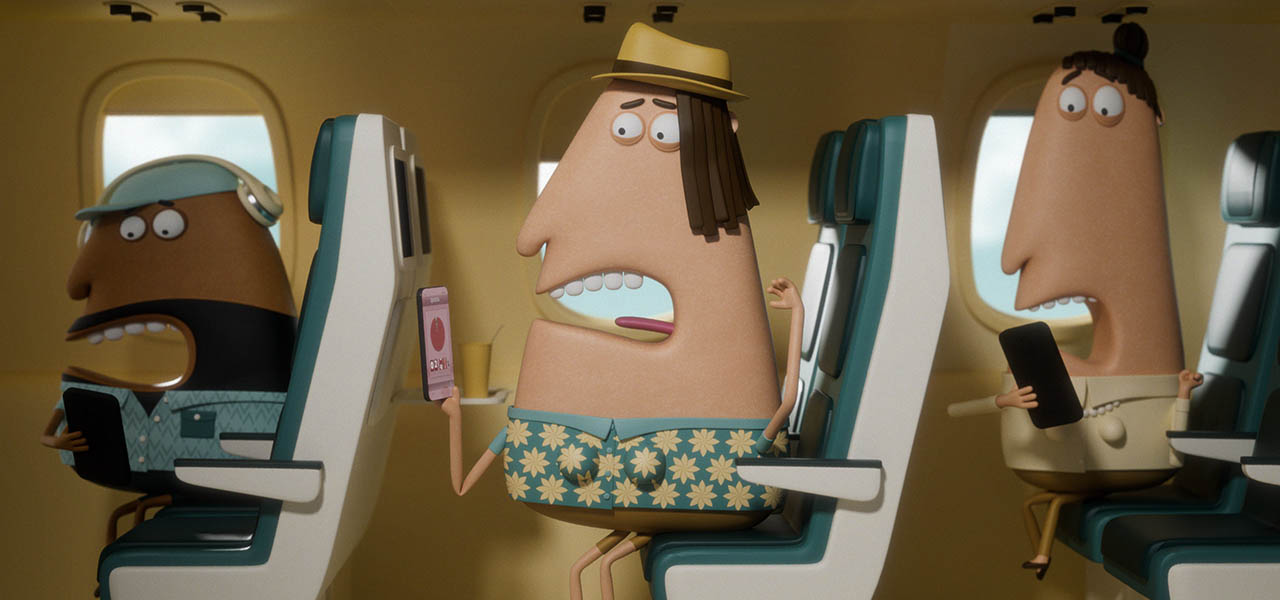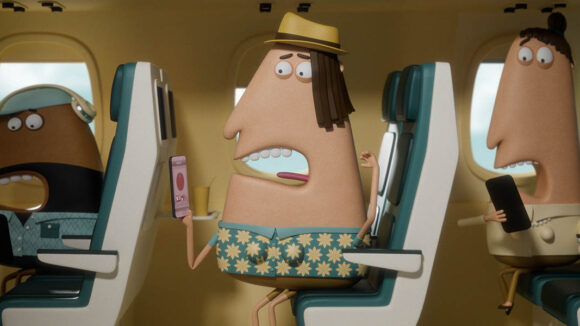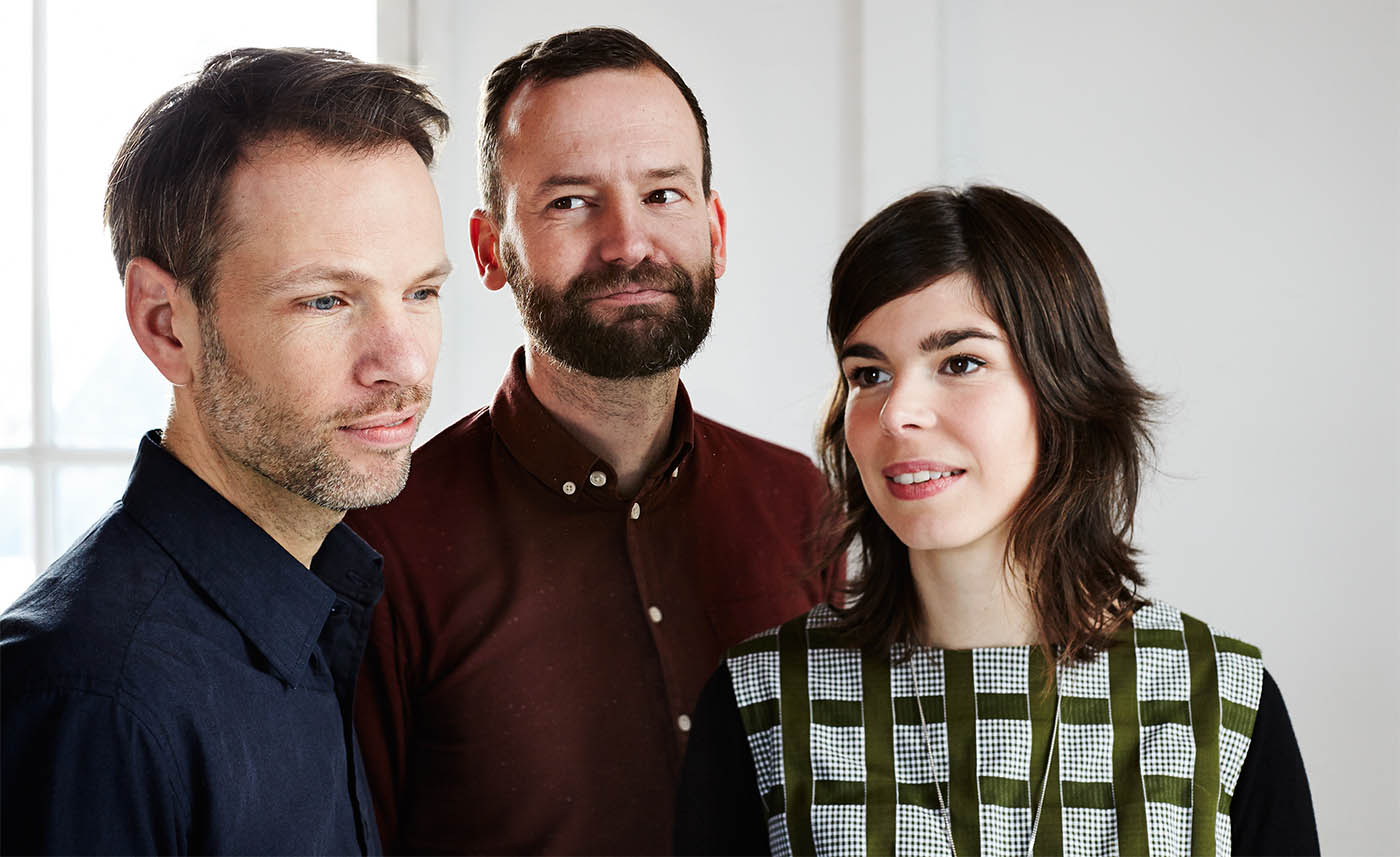

2025 Oscar Contenders: ‘Quota’ Directors Job Roggeveen, Joris Oprins, and Marieke Blaauw
Welcome to Cartoon Brew’s series of spotlights focusing on the animated shorts that have qualified for the 2025 Oscars. The films in this series have qualified through one of multiple routes: by winning an Oscar-qualifying award at a film festival, by exhibiting theatrically, or by a Student Academy Award.
Today’s film is Quota from Dutch trio Job Roggeveen, Joris Oprins, and Marieke Blaauw. The film has qualified through theatrical exhibition and premiered at the Toronto International Film Festival (TIFF), where it won an honorable mention for Best International Short Film.
The previously-Oscar-nominated trio (A Single Life), known professionally as Job, Joris & Marieke, tackle the climate crisis and humanity’s global footprint in their latest short. Quota, through an entertaining two-minute story, offers a cynical and gritty take on our highly connected society – and the rather extreme means that are seemingly necessary to raise people’s awareness about our deteriorating environment.
Cartoon Brew: With a big dose of black humor, you portray a society where the climate crisis is a joke, until it isn’t. As filmmakers, how does this relate to your own professional views and careers and what does it mean to be a climate-conscious filmmaker today?
Job, Joris and Marieke: We are very concerned about the climate crisis. However, we never speak out strongly about it on a personal level. When someone tells us about their umpteenth flight for a holiday, we just nod politely. We’re afraid to create awkward or unpleasant situations by giving our opinion. But when it comes to our work, we feel we can be more outspoken. Quota gives us the opportunity to clearly and loudly express what we truly think about humanity’s role in the climate crisis.
When Quota premiered at TIFF, we weren’t there. We haven’t flown to festivals in years, and we only attend festivals that are within train distance. This often means we must turn down festival invitations, which isn’t always appreciated. And we understand that, because festivals rely on the presence of filmmakers, and for filmmakers, those trips are important to meet other filmmakers and get inspired. For us, going to TIFF would have been great for our network. So it was quite a sacrifice not to attend our own premiere at TIFF.
So, we were very pleased when Quota won an honorable mention and the jury stated, “We also applaud the filmmakers for practicing what they preach by choosing not to attend the festival this year as a way to limit their carbon footprint and stay within their ‘quota.’” Now, we’re thrilled that the film is qualified for the Oscars. But if Quota gets nominated, we will not fly to L.A. to attend the award ceremony. It will be an even harder pill to swallow for us, but we believe it’s an important statement to make. We love our work, and it means a lot to us, but we feel the climate crisis is more important.
What was it about this story or concept that connected with you and compelled you to direct the film?
We are all three very concerned about the climate crisis. We try to do what’s best – we don’t own a car, we don’t eat meat, we don’t fly, and you can find us at XR (Extinction Rebellion) protests. For a while now, we’ve been looking for a way to incorporate our views on this subject into a film. But we feared it would only lead to a preachy film and we really hate that.
But one day we were talking about carbon footprints and how there are ways to calculate your own CO2 emissions, and we discussed how it would be fair if everyone got a designated CO2 quota. And then we took it a step further: what if everyone got a fixed percentage of CO2? And what would happen when you surpass your quota? Quite an impossible scenario in real life, but not in animation. The part on what would happen if your percentage came to zero especially sparked our imagination. We came up with a cruel and funny consequence: when you’re at zero, you explode. This turned the idea around, this wouldn’t be a preachy boring film, but a hilarious gory one! Quota is a funny film, but it also holds up a mirror to your own behavior. It makes you laugh only to realize that the joke’s on you.

What did you learn through the experience of making this film, either production-wise, filmmaking-wise, creatively, or about the subject matter?
We made this film as part of the Ultrakort [Ultra Short] program, a yearly project by the Netherlands Film Fund where different filmmakers are chosen to create a two-and-a-half minute short film. The shorts are screened before movies in Vue and NFO [Dutch] cinemas. We also made A Single Life (which was nominated for an Oscar) and A Double Life (nominated for the Dutch Academy Award) through the same Ultrakort program.
We love the Ultrakort Program because it forces you to tell your story in a very compact way. Quota was a great fit for this format, but keeping it to just two-and-a-half minutes was the main challenge. We had a lot of shots to show, and each one had to be incredibly brief. We were literally cutting frames from one shot just to add a few frames to another shot that felt too short.
Another challenge was the story. We needed to show people emitting CO2. And we had to find the right examples. The CO2 emitting situations needed to be accurate, recognizable, but also funny. And the situations also had to be understandable for people who aren’t too familiar with their own impact on the climate crisis. We struggled with that a bit. For example, importing foreign fruit emits a lot of CO2, but if we can only show a character eating an avocado, the message might not come across clearly. We also had to decide when the ‘crime’ occurs, at what moment does someone lose CO2 percentage? Does your CO2 quota shrink when you buy meat, when you eat it, or when the animal is killed? These kinds of discussions were really interesting, and we got help from an NGO with expertise in this area.
Can you describe how you developed your visual approach to the film? Why did you settle on this style/technique?
We are a cg studio with a background in stop motion, so it was natural for us to make Quota in cg. However, we wanted to take a different approach to the visual style, aiming for a more graphic look. We liked this aesthetic because it kept everything clean and easy to follow, which was important given the film’s fast pace.
In the end, we created a very flat style of 3d, something like 2.5d. The characters are quite flat, and we used a focal lens with minimal perspective. We designed the sets as if they were theater sets, very flat and two-dimensional, with only frontal shots. And with all the action taking place in the center of the frame.
Designing these flat characters was a lot of fun. Since they had to scream a lot, giving them big mouths was a key feature. We also wanted to represent a diverse cast, so we made the character designs modular – like Lego – allowing us to easily swap out hair, clothes, or animation. We chose a very simplified character design; the characters consist of one simple shape and don’t have a neck. Not having a neck was very important because we thought that would look funnier the moment the characters’ heads explode. Animating in this flat world was equally enjoyable. We had to focus on creating strong silhouettes and avoid poses where the characters’ hands were in front of their bodies. Plus, they could only move along one axis, which added an extra layer of challenge.

.png)